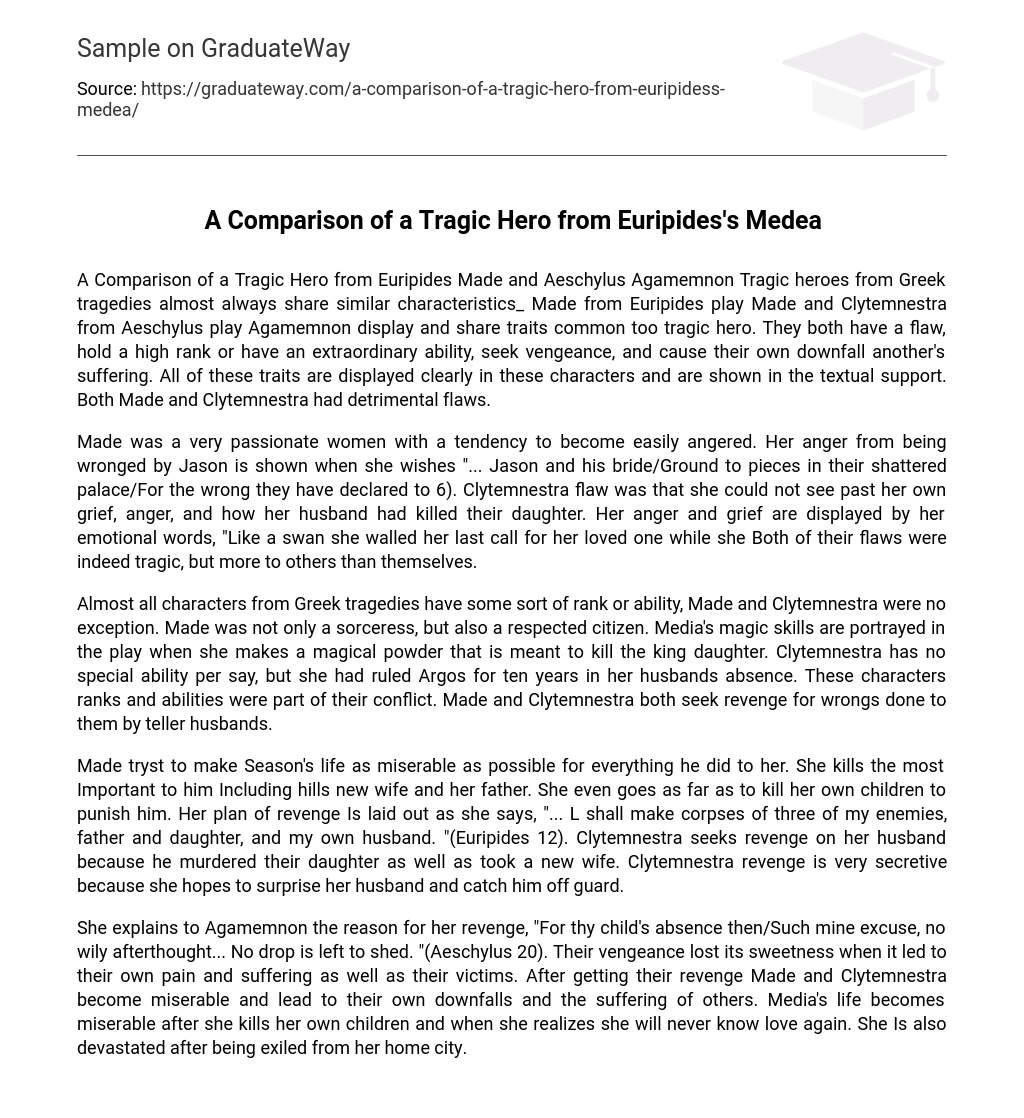A Comparison of a Tragic Hero from Euripides Made and Aeschylus Agamemnon Tragic heroes from Greek tragedies almost always share similar characteristics_ Made from Euripides play Made and Clytemnestra from Aeschylus play Agamemnon display and share traits common too tragic hero. They both have a flaw, hold a high rank or have an extraordinary ability, seek vengeance, and cause their own downfall another’s suffering. All of these traits are displayed clearly in these characters and are shown in the textual support. Both Made and Clytemnestra had detrimental flaws.
Made was a very passionate women with a tendency to become easily angered. Her anger from being wronged by Jason is shown when she wishes “… Jason and his bride/Ground to pieces in their shattered palace/For the wrong they have declared to 6). Clytemnestra flaw was that she could not see past her own grief, anger, and how her husband had killed their daughter. Her anger and grief are displayed by her emotional words, “Like a swan she walled her last call for her loved one while she Both of their flaws were indeed tragic, but more to others than themselves.
Almost all characters from Greek tragedies have some sort of rank or ability, Made and Clytemnestra were no exception. Made was not only a sorceress, but also a respected citizen. Media’s magic skills are portrayed in the play when she makes a magical powder that is meant to kill the king daughter. Clytemnestra has no special ability per say, but she had ruled Argos for ten years in her husbands absence. These characters ranks and abilities were part of their conflict. Made and Clytemnestra both seek revenge for wrongs done to them by teller husbands.
Made tryst to make Season’s life as miserable as possible for everything he did to her. She kills the most Important to him Including hills new wife and her father. She even goes as far as to kill her own children to punish him. Her plan of revenge Is laid out as she says, “… L shall make corpses of three of my enemies, father and daughter, and my own husband. “(Euripides 12). Clytemnestra seeks revenge on her husband because he murdered their daughter as well as took a new wife. Clytemnestra revenge is very secretive because she hopes to surprise her husband and catch him off guard.
She explains to Agamemnon the reason for her revenge, “For thy child’s absence then/Such mine excuse, no wily afterthought… No drop is left to shed. “(Aeschylus 20). Their vengeance lost its sweetness when it led to their own pain and suffering as well as their victims. After getting their revenge Made and Clytemnestra become miserable and lead to their own downfalls and the suffering of others. Media’s life becomes miserable after she kills her own children and when she realizes she will never know love again. She Is also devastated after being exiled from her home city.
Her pain and suffering befallen me and has broken my heart. “(Euripides). Clytemnestra does not suffer herself in this play but will later be killed by her son in a later play. Until then she is responsible of causing the city and her son to suffer immensely. These two characters are perfect examples of tragic heroes and their traits. Not only are Made and Clytemnestra perfect examples, but they are some of the best and easily seen examples. They follow every step that is found in most Greek tragedies to cause some sort of conflict and create the drama.





